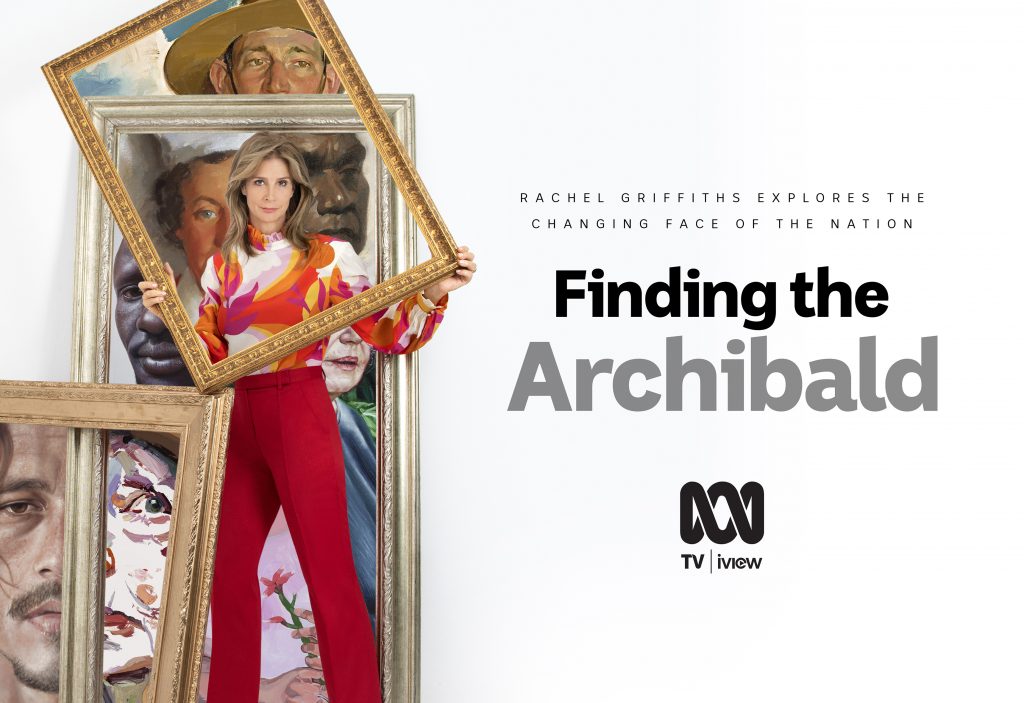
Art lover and actor Rachel Griffiths is going on a cultural and reflective romp through Australia’s most coveted and controversial arts prize this June in the three-part part series Finding The Archibald. Starting Tuesday 15 June at 8.30pm on ABC and ABC iview, Rachel takes a deep dive into the 100-year history of the Archibald Prize.
Finding The Archibald also follows Natalie Wilson from the Art Gallery of NSW on her pursuit to curate an ambitious exhibition that celebrates 100 years of Australia’s oldest and most-loved portrait award, the Archibald Prize.
Rachel’s journey into Archibald history becomes a personal mission, as she attempts to find one portrait that encapsulates the changing face of Australia over the last century. Along the way Rachel catches up with Archibald artists such as Ben Quilty, Natasha Bieniek, Vincent Namatjira, Abdul Abdullah, Wendy Sharpe and Vincent Fantauzzo and subjects including Asher Keddie, Wendy Whiteley, Deng Adut, John Howard and Penelope Seidler.
Travelling across the country on an elaborate treasure hunt, Rachel immerses herself in a face-fest and cultural reflection of our nation throughout the past century. How have our social values changed over the years? Who were our ‘heroes’ then and who are they now? Who decides who is worthy of being immortalised and why? How does the Archibald reflect the changes in who we are? Can Rachel find ONE portrait that not only encapsulates this changing face of our nation, but that will stand the test of time for another 100 years?
Rachel Griffiths said: “It’s been a thrill to collaborate with Mint Pictures on Finding The Archibald because I’m a huge art enthusiast and have been surrounded by art all my life – my mum is an artist and I’m married to an artist. And so being asked to look at thousands of portraits was a pleasure, although being challenged to single out just ‘one’ was a confronting mission.
But for me it’s really all been about the journey; plunging through a century of fascinating and revealing Australian stories as reflected through our annual face-fest. And while it’s a wonderful series about art, at its core it’s really a series about us, our identity and our image of ourselves. I hope it provokes discussion and debate.”
Natalie Wilson, curator of Archie 100: A Century of the Archibald Prize at the Art Gallery of New South Wales, said the exhibition honours the artists who have made the Archibald Prize the most sought-after accolade in Australian art today.
“Archie 100 is the result of many years of research into more than 6000 works shown in the Archibald to date, and a national public appeal for help to locate lost portraits. The exhibition features a selection of works that uncover fascinating changes in society and enable people to experience how artistic styles and approaches to portraiture have changed over the course of a century.”
First awarded in 1921, the Archibald Prize was established following a bequest from former Art Gallery of NSW trustee and co-founder of The Bulletin magazine, JF Archibald (1856-1919), whose aim was to foster portraiture, support artists and perpetuate the memory of great Australians. The open competition, which is judged by the trustees of the Gallery, has been awarded annually (with two exceptions: 1964 and 1980) to the best portrait, ‘preferentially of some man or woman distinguished in art, letters, science or politics, painted by any artist resident in Australasia’.
Today the Archibald Prize is one of the country’s most prestigious arts prizes, and the annual exhibition draws tens of thousands of patrons to the Art Gallery of NSW each year.
Click here to take a first look at Finding The Archibald.
Production credit: A Mint Pictures production in association with Magdalene Media. Principal production investment from Screen Australia and the ABC. In association with Screen NSW and Film Victoria. Series Director Ariel White. Series Producer Dan Goldberg. Executive Producers Adam Kay and Rachel Griffiths. ABC Manager Factual Julia Hanna. ABC Managing Editor, Factual Richard Huddleston. Head of Factual and Culture Jennifer Collins.



